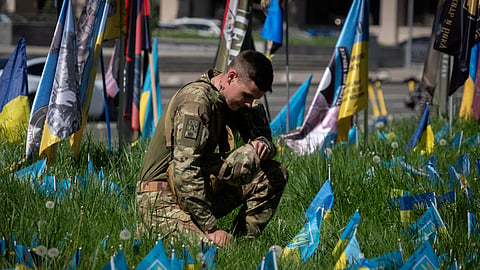

Sunday marks 801 days since Vladimir Putin ordered Russia’s invasion of Ukraine. The war has unleashed catastrophic destruction, displaced millions, resulted in forced conscription and ukhyliant or draft dodgers, claimed lives and cost billions. Prospects of a peace deal in the fall of 2022 were dashed and Hail Mary offensives have flailed. It is a war where defeat and victory defy definition. It is true the war refurbished unity among the West and NATO. It is equally true that the effort of the West to weaponise economics—sanctions that are at best a slow puncture and freezing of reserves—have spluttered and flattered to deceive.
This week, days before May 9 Victory Day in Russia, the West presented Putin cause for celebration. For nearly a year, the US-led G7 confabulated on using the frozen assets of Russia to fund Ukraine. The G7 last week reached a private consensus to take the idea of using Russian money against Russia off the table. It is a real-time illustration of the power of realpolitik realities. Interestingly, news of the “private consensus” within the G7 first appeared in a news portal specialising in oil and energy, and was followed by Russian news agency TASS and RBC-Ukraine.
The details of the idea—which troubled many developing nations and raised questions—and its collapse merit attention. In February 27, 2022, over a weekend, the G7 led by the US imposed sanctions on Russian entities and froze access to over $300 billion of reserves. The use of Russian assets was always a seductive idea. In February 2024, US Treasury Secretary Janet Yellen observed at a G20 meeting in São Paulo that there was a “strong international law, economic and moral case” for using Russian assets and added it would also incentivise Moscow to negotiate peace.
The idea was propelled to the table by the struggle to fund the Ukraine war effort in the wake of the polarisation and dysfunction in Washington and disagreements in a divided Europe. In July 2023, US Congressman Michael McCaul introduced the REPO for Ukrainians Act. The bill, passed on April 23, 2024 and signed by Joe Biden the next day, authorised the president to “confiscate, transfer or vest” any Russian assets within the US jurisdiction. The urgency, in part, seems to have stemmed from fears of a possible Trump presidency and the former president’s differentiated view on the war and on aid to Ukraine.
The decision to enact a law to confiscate was less complicated for the US than for Europe. Across the Atlantic, the enthusiasm for the idea was unsurprisingly muted and faced pushback. The devil of distress and distrust is embedded in the location of the monies. The bulk of the Russian assets—over $207 billion of the $300 billion—are in Euro assets. The assets are parked in the Belgian clearing house Euroclear.
The ideators toyed with three options—outright confiscation, leverage of the assets as collateral to borrow against and fund, and use of accrued returns for Ukraine. All three options trigger and bring into focus questions of ownership and legitimacy. Lieve Mostrey, CEO of Euroclear, slammed the idea and said, “Using assets that don’t belong to you as collateral is pretty close to an indirect seizing or a commitment to future seizing, which could have exactly the same effects on the markets as a direct seizing.” Euroclear, already facing cases in Russia, would be vulnerable to more suits. There is also the issue of retaliation—the Leave Russia campaign lists over 1,600 transnational companies still operational in Russia.
Beyond the legal challenges to Euroclear, there is also the potential of macroeconomic consequences for the Eurozone. The Euro is the preferred currency for over $2.2 trillion of sovereign reserves. A confiscation would trigger distrust. ECB President Christine Lagarde warned that the move to confiscate and dispose of assets needs careful thought as it would “start breaking the international order that you want to protect, that you would want Russia and all countries to respect”.
For now, the grand idea to use Russian money against Russia seems to be off the table. But the consequence of the vagaries of geopolitics is visible in the commodities markets. The rising trend of central banks buying gold—over 1,000 tons in 2022 and 2023 as per the World Gold Council—represents rising distrust and the unravelling of the rule-based world order. The calling off of the geopolitical adventure attempted by G7, of using Russian money against Russia, reveals the limitations of deploying economic measures as instruments of war in an interdependent world.
The inefficacy of systems and inadequacies of politics in halting aggressors is haunting the West. The US—as the anointed guardian of the rule-based world order and leader of the G7—is confronted by new realities. It has battled in a hot war in Korea, seen spectacular retreats from Vietnam and Afghanistan, experience of the Pygmalion effect in its dealings with China and the cold war with the Soviet Union. Its ability to navigate is challenged by politics at home and strongmen abroad.
The frontiers of war are open and expanding. Can the current tool-kit serve the purpose if and when China moves to annexe Taiwan? The 20th century playbook is worn out and can at best contain conflict. The Putin vs West saga represents a template in lessons for the future.
Shankkar aiyAr
Author of The Gated Republic, Aadhaar: A Biometric History of India’s 12 Digit Revolution, and Accidental India
(shankkar.aiyar@gmail.com)